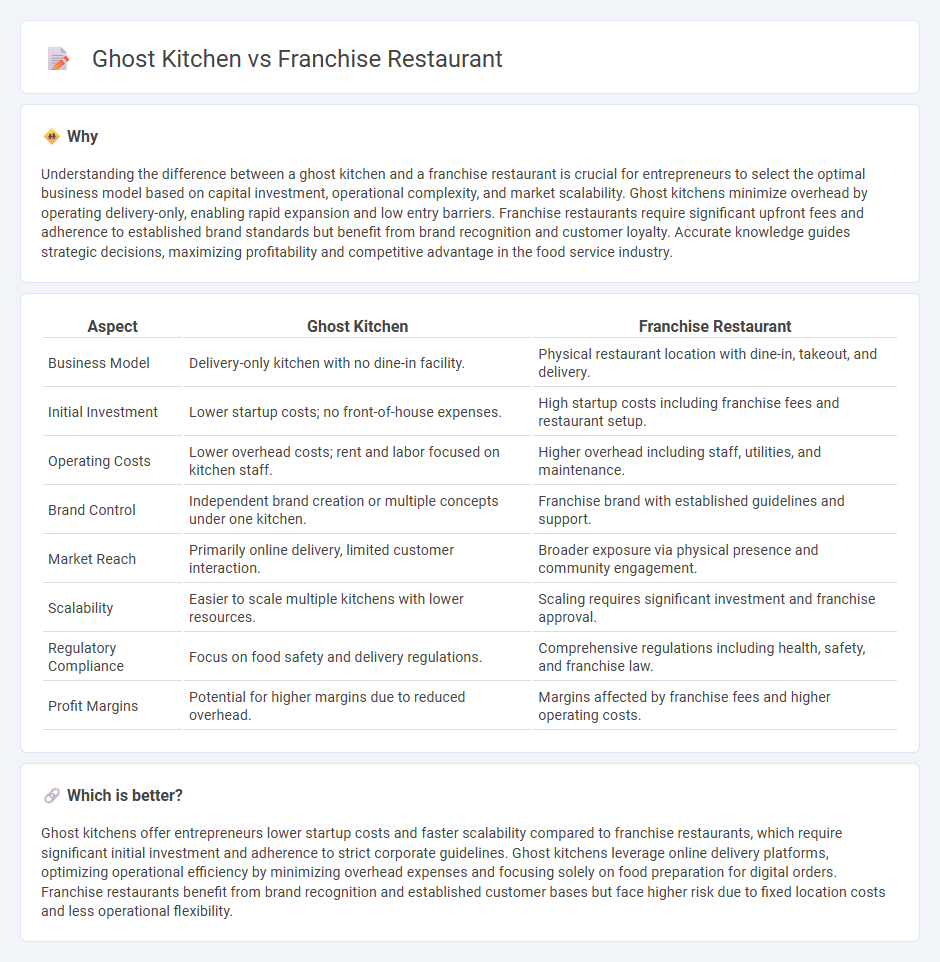
Ghost kitchens operate exclusively through online orders without a physical dining space, significantly reducing overhead costs and enabling rapid scalability in the foodservice industry. Franchise restaurants require substantial upfront investment, established brand recognition, and consistent operational standards to attract and retain customers. Explore the distinct advantages and challenges of ghost kitchens versus franchise restaurants to determine the best entrepreneurial path for your food business.
Why it is important
Understanding the difference between a ghost kitchen and a franchise restaurant is crucial for entrepreneurs to select the optimal business model based on capital investment, operational complexity, and market scalability. Ghost kitchens minimize overhead by operating delivery-only, enabling rapid expansion and low entry barriers. Franchise restaurants require significant upfront fees and adherence to established brand standards but benefit from brand recognition and customer loyalty. Accurate knowledge guides strategic decisions, maximizing profitability and competitive advantage in the food service industry.
Comparison Table
| Aspect | Ghost Kitchen | Franchise Restaurant |
|---|---|---|
| Business Model | Delivery-only kitchen with no dine-in facility. | Physical restaurant location with dine-in, takeout, and delivery. |
| Initial Investment | Lower startup costs; no front-of-house expenses. | High startup costs including franchise fees and restaurant setup. |
| Operating Costs | Lower overhead costs; rent and labor focused on kitchen staff. | Higher overhead including staff, utilities, and maintenance. |
| Brand Control | Independent brand creation or multiple concepts under one kitchen. | Franchise brand with established guidelines and support. |
| Market Reach | Primarily online delivery, limited customer interaction. | Broader exposure via physical presence and community engagement. |
| Scalability | Easier to scale multiple kitchens with lower resources. | Scaling requires significant investment and franchise approval. |
| Regulatory Compliance | Focus on food safety and delivery regulations. | Comprehensive regulations including health, safety, and franchise law. |
| Profit Margins | Potential for higher margins due to reduced overhead. | Margins affected by franchise fees and higher operating costs. |
Which is better?
Ghost kitchens offer entrepreneurs lower startup costs and faster scalability compared to franchise restaurants, which require significant initial investment and adherence to strict corporate guidelines. Ghost kitchens leverage online delivery platforms, optimizing operational efficiency by minimizing overhead expenses and focusing solely on food preparation for digital orders. Franchise restaurants benefit from brand recognition and established customer bases but face higher risk due to fixed location costs and less operational flexibility.
Connection
Ghost kitchens and franchise restaurants are intertwined through their shared business models focused on scalability and cost-efficiency in the food service industry. Franchise restaurants leverage ghost kitchens to expand their brand presence rapidly without the high overhead of traditional storefronts, enabling multiple locations to streamline operations and reach a broader customer base via online delivery platforms. This synergy allows franchises to optimize resource allocation and adapt quickly to market trends in the digital economy.
Key Terms
Business Model
Franchise restaurants operate with established brand recognition, physical locations, and consistent customer experience, leveraging a proven business model with higher startup costs and operational complexity. Ghost kitchens focus on delivery-only services, minimizing overhead by eliminating dine-in spaces and optimizing for online orders through third-party platforms, allowing scalability and lower initial investment. Explore the key differences in business models to determine which option aligns with your entrepreneurial goals.
Brand Control
Franchise restaurants offer strong brand control through standardized recipes, customer experience, and physical presence, ensuring consistent brand identity across locations. Ghost kitchens, while cost-effective and flexible, often face challenges in maintaining brand consistency due to their delivery-only model and lack of direct customer interaction. Discover how brand control differs between these models to optimize your business strategy.
Overhead Costs
Franchise restaurants typically incur higher overhead costs due to expenses like rent, utilities, staff salaries, and interior maintenance, often averaging 10-15% of total revenue. Ghost kitchens, operating without a storefront and dining area, significantly reduce overhead by eliminating front-of-house expenses, resulting in costs as low as 5-8% of revenue. Explore detailed cost comparisons and suitability of each model for your business goals.
Source and External Links
What is a Franchise Restaurant? - Toast POS - A franchise restaurant is a business where individual investors purchase the rights to use a brand's name, business model, and products from a franchisor, paying ongoing fees while receiving business support to operate under the established brand.
What is a Restaurant Franchise? - Peckwater Brands - A restaurant franchise is a model in which a franchisor licenses its brand name, products, and services to a franchisee, who runs the restaurant and pays fees to the franchisor in exchange for brand use and operational guidance.
How to Franchise a Restaurant: Guide for Success - CloudKitchens - Franchising a restaurant involves setting up a legal structure to protect assets, creating detailed operations manuals for brand consistency, and managing multiple separate entities for the parent company and franchise locations.
 dowidth.com
dowidth.com